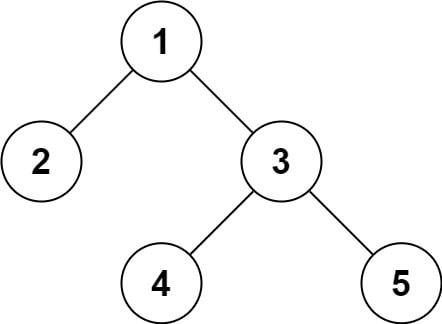Serialization is the process of converting a data structure or object into a sequence of bits so that it can be stored in a file or memory buffer, or transmitted across a network connection link to be reconstructed later in the same or another computer environment.
Design an algorithm to serialize and deserialize a binary tree. There is no restriction on how your serialization/deserialization algorithm should work. You just need to ensure that a binary tree can be serialized to a string and this string can be deserialized to the original tree structure.
Clarification: The input/output format is the same as how LeetCode serializes a binary tree. You do not necessarily need to follow this format, so please be creative and come up with different approaches yourself.
Example 1:
Input: root = [1,2,3,null,null,4,5]
Output: [1,2,3,null,null,4,5]
Example 2:
Input: root = []
Output: []
Constraints:
- The number of nodes in the tree is in the range
[0, 104]. -
-1000 <= Node.val <= 1000
SOLUTION:
# Definition for a binary tree node.
# class TreeNode(object):
# def __init__(self, x):
# self.val = x
# self.left = None
# self.right = None
class Codec:
def serialize(self, root: Optional[TreeNode]) -> str:
tree = {}
paths = [(root, 0)]
while len(paths) > 0:
curr, i = paths.pop()
if curr:
tree[i] = curr.val
paths.append((curr.left, 2 * i + 1))
paths.append((curr.right, 2 * i + 2))
return ";".join(["{}={}".format(k, v) for k, v in tree.items()])
def deserialize(self, data: str) -> Optional[TreeNode]:
vals = data.split(";")
tree = {}
for v in vals:
if len(v) > 0:
key, value = v.split("=")
tree[int(key)] = int(value)
if len(tree) == 0:
return None
root = TreeNode()
paths = [(root, 0)]
while len(paths) > 0:
curr, i = paths.pop()
curr.val = tree[i]
if (2 * i + 1) in tree:
curr.left = TreeNode()
paths.append((curr.left, 2 * i + 1))
if (2 * i + 2) in tree:
curr.right = TreeNode()
paths.append((curr.right, 2 * i + 2))
return root
# Your Codec object will be instantiated and called as such:
# ser = Codec()
# deser = Codec()
# ans = deser.deserialize(ser.serialize(root))



Top comments (0)